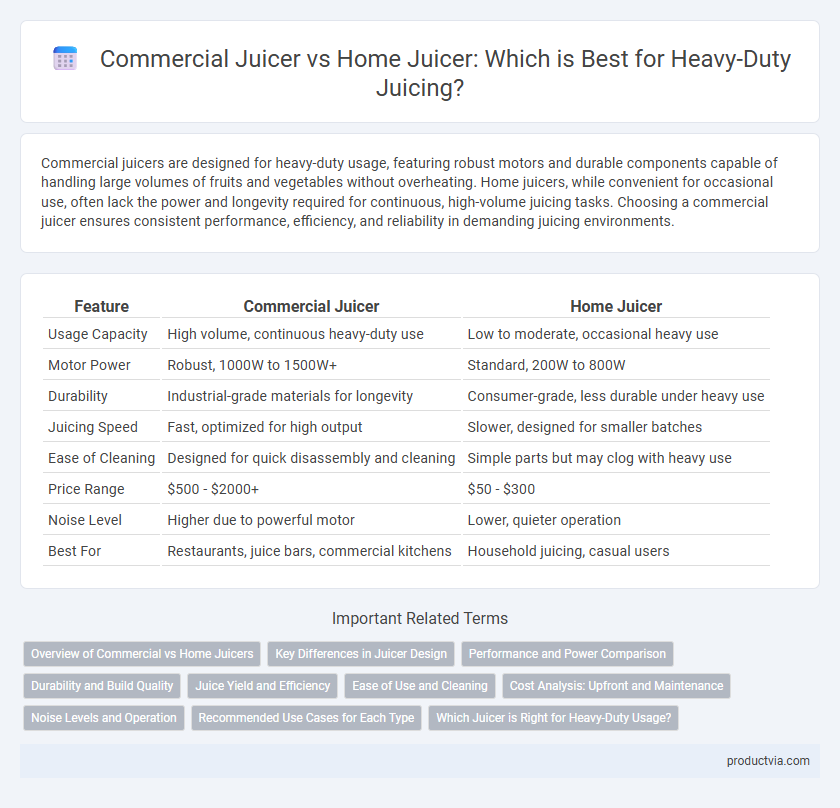Commercial juicers are designed for heavy-duty usage, featuring robust motors and durable components capable of handling large volumes of fruits and vegetables without overheating. Home juicers, while convenient for occasional use, often lack the power and longevity required for continuous, high-volume juicing tasks. Choosing a commercial juicer ensures consistent performance, efficiency, and reliability in demanding juicing environments.
Table of Comparison
| Feature | Commercial Juicer | Home Juicer |
|---|---|---|
| Usage Capacity | High volume, continuous heavy-duty use | Low to moderate, occasional heavy use |
| Motor Power | Robust, 1000W to 1500W+ | Standard, 200W to 800W |
| Durability | Industrial-grade materials for longevity | Consumer-grade, less durable under heavy use |
| Juicing Speed | Fast, optimized for high output | Slower, designed for smaller batches |
| Ease of Cleaning | Designed for quick disassembly and cleaning | Simple parts but may clog with heavy use |
| Price Range | $500 - $2000+ | $50 - $300 |
| Noise Level | Higher due to powerful motor | Lower, quieter operation |
| Best For | Restaurants, juice bars, commercial kitchens | Household juicing, casual users |
Overview of Commercial vs Home Juicers
Commercial juicers are designed with powerful motors and durable components to handle continuous, heavy-duty usage, making them ideal for high-volume environments such as juice bars and restaurants. Home juicers, while efficient for occasional use, typically feature less robust construction and lower motor power, limiting their capacity to process large quantities of produce without overheating or wear. Investing in a commercial juicer ensures consistent performance, faster extraction times, and longer lifespan under intensive workloads compared to standard home models.
Key Differences in Juicer Design
Commercial juicers feature robust, industrial-grade motors designed for continuous, heavy-duty usage, whereas home juicers typically have lower-powered motors suited for occasional use. Commercial models often incorporate durable stainless steel components and larger feed chutes to handle high volumes of fruits and vegetables efficiently. In contrast, home juicers prioritize compact design and ease of cleaning, with smaller capacity and less emphasis on long-term durability.
Performance and Power Comparison
Commercial juicers are designed with high-powered motors ranging from 1 to 3 horsepower, enabling continuous heavy-duty usage without overheating, whereas home juicers typically have motors under 1 horsepower suited for occasional use. The performance of commercial juicers includes faster extraction speeds, larger feeding chutes, and enhanced durability to handle extensive juicing in restaurants or juice bars. Home juicers, while compact and affordable, often struggle with dense or fibrous produce during prolonged operation, making them less efficient for heavy-duty juicing tasks.
Durability and Build Quality
Commercial juicers are engineered with heavy-duty stainless steel components and reinforced motors to withstand continuous, high-volume extraction, making them ideal for rigorous use in cafes and juice bars. Home juicers typically feature lighter materials and lower-capacity motors that may overheat or wear out quickly under heavy, frequent operation. Investing in a commercial-grade juicer ensures superior durability, longer lifespan, and consistent performance for demanding juicing needs.
Juice Yield and Efficiency
Commercial juicers deliver significantly higher juice yield and efficiency compared to home juicers, making them ideal for heavy-duty usage in cafes or juice bars. Equipped with powerful motors and durable components, commercial models extract more juice from fruits and vegetables quickly while minimizing waste. Home juicers, though more affordable and compact, often struggle with continuous operation and produce lower yield, reducing overall efficiency in heavy-use scenarios.
Ease of Use and Cleaning
Commercial juicers offer superior ease of use for heavy-duty tasks, featuring robust motors and wide feeding chutes that minimize prep time. Their design often includes dishwasher-safe parts and tool-free disassembly, significantly reducing cleaning effort and downtime. Home juicers, while user-friendly for light use, typically require more manual cleaning and have smaller capacities, making them less efficient for continuous heavy-duty juicing.
Cost Analysis: Upfront and Maintenance
Commercial juicers typically have a higher upfront cost ranging from $500 to over $2,000 due to their durable materials and powerful motors designed for heavy-duty usage. Maintenance expenses for commercial models are often lower in the long run because of their easy-to-replace parts and robust construction that reduces breakdowns. In contrast, home juicers may cost between $100 and $400 initially but incur higher maintenance costs over time due to less durable components and more frequent part replacements under heavy use.
Noise Levels and Operation
Commercial juicers are designed for heavy-duty usage with powerful motors that provide continuous operation and handle high volumes efficiently, often producing noise levels around 70-85 decibels. Home juicers typically operate at lower noise levels, approximately 50-70 decibels, but may overheat or lose efficiency under prolonged heavy use. Selecting a commercial juicer ensures durability and performance with noise insulation technologies that reduce sound during intense juicing tasks.
Recommended Use Cases for Each Type
Commercial juicers are designed for high-volume juice production, making them ideal for juice bars, restaurants, and large-scale catering services where continuous, heavy-duty usage is required. Home juicers are better suited for occasional use, smaller batches, and personal consumption, offering convenience and ease of cleaning without the robust power and durability needed for commercial settings. For heavy-duty usage, commercial juicers provide superior motor strength, faster processing speeds, and enhanced longevity, ensuring consistent performance in demanding environments.
Which Juicer is Right for Heavy-Duty Usage?
Commercial juicers are designed with powerful motors, durable stainless steel components, and larger feed chutes to handle continuous heavy-duty usage in restaurants and juice bars. Home juicers, while suitable for occasional use, typically lack the motor strength and build quality needed for extended operation or high-volume juicing. For heavy-duty usage, investing in a commercial juicer ensures efficiency, longevity, and consistent juice quality.
Commercial juicer vs Home juicer for heavy-duty usage Infographic

 productvia.com
productvia.com